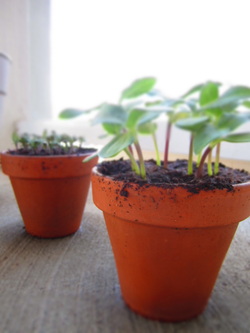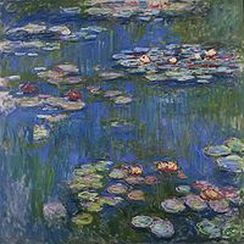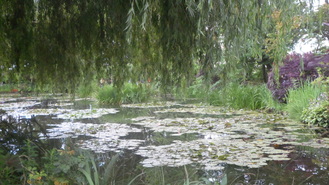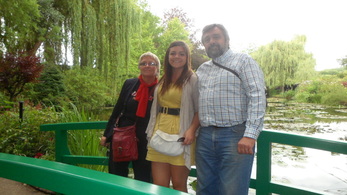 Having presently embarked on my journey through law school – a quest which I cannot help but analogize to a Dantean voyage ascending from the realm of depravity (Intro to Criminal Law) to the forms of Truth and Justice (*please roll eyes and insert skeezy lawyer joke here*) – my apartment’s small patio garden serves as one of my greatest consolations and sources of joy. (Hours of reading cases does not afford me the luxury of having nothing to do but commune with Lady Philosophy, so I have to seize from ordinary moments whatever “life and food for future years” they allow me.) Upon moving in about one month ago, before I’d even unpacked all my clothes I had already planted small pots of basil, tomatoes and sunflowers, and window boxes of rudbeckia.
A garden, no matter how small, poses a unique challenge and opportunity to its keeper. The end goal, of course, is cultivating fruitful plants: juicy tomatoes and savory herbs to enhance one’s cooking and sunny flowers to smile up at you when the going gets tough. However, you cannot just drop some seeds in a pot, add dirt, water periodically, and wait for them to grow. Growing a garden requires a particular attentiveness. Shades of green indicate the plant’s over-, under- or adequate watering. Dead leaves must be removed. The seedlings must spend sufficient time in the light and sufficient time in the shade. Even then, beyond ensuring the circumstances are ideal and you are providing what your garden requires, you must wait, let time take its course. If you poke in the soil to see if the seeds you’ve planted have begun to spout, you risk exposing them to the elements while they’re most vulnerable. If you water them excessively with the hope to hasten their growth, you might unearth and drown them. If exposed to the sun the whole day (just photosynthesize already!!), they whither and die. You find yourself, therefore, tragically and incontrovertibly powerless in the face of time. You’ve done all you can to cultivate your garden; the rest is left to fate, the efficient cause of the plant, God, the seed’s biological imperative to survive and propagate itself… pick your Power!. The point is, it’s out of your hands.
Why be coy? The metaphors we can draw from gardening and agriculture are perhaps some of the earliest to which we’re introduced, even as children (note: magic beans lead to trouble; Johnny Appleseed was the man!), and philosophy and theology have long employed them as parallels to the human experience of physical, intellectual, and spiritual growth. We’ve had all of this hammered into our heads since sixth grade when we learned what a metaphor is, but simply intellectualizing it cannot bring forth the fruit that one’s individual practice of gardening yields. Go plant something! Cultivate a garden, cultivate wisdom. :)
~ KS
Dear all, I came across this short essay recently, and I really enjoyed it. I thought you all would too, as fellow readers - I think it applies to men who read as well as women.****7/25 update: So, since Joey complained, I am going to turn this into a proper pensee. I present to you, Why you should date a Man who Reads (or, why PLS guys have no trouble scoring). It's easy for a girl to pick up a man who reads - just check a local library or used bookstore. Forget Hallmark cards, the man who reads can court his lady with real poetry: Shakespeare, John Donne, and Marlowe. Come live with me and be my love, much? The man who reads is easy to shop for - if Robert Ludlum doesn't work, try Dickens. The man who reads is inevitably the best conversationalist; his prose has been honed by great craftsmen. He knows the value of tongue and pen... take that how you will. He has the air and the heart of the heroes he's read about- and I don't mean that snot Achilles. He might, just might, be OK with Mr. Darcy comparisons. This means that he is one man in a million. The man who reads has a private world better than golf or fantasy football. When he "disappears" for a few hours, his girlfriend feels no suspicion. He has a breadth of thought and knowledge far beyond that of the man who does not read. To him, the noble worlds of chivalry, of ancient thought or Elizabethan humor, live again in the well-read pages of his books. And the man who reads embodies the best of those varied ages. The one thing even better than dating a man who reads? Marrying one.LC
A good way to become a writer is to spend a lot of time by yourself. Then you will think thoughts and have no one to tell them to, so you will end up wanting to write them down and post them to your friends or maybe scatter them to the winds and see if anyone responds.
Like this thought I had when eating lunch by myself today. I used to think that I wasn't a big fan of vegetables and fruit. Now I realize that I was wrong; I just don't like vegetables and fruit in every instance. I am in favor of vegetables and fruit in the abstract. But unfortunately, not all pieces of fruit and vegetables are created equal. (It seems only men have that distinction.) The problem here is not that I don't like vegetables and fruit; I love a good, crisp, sweet apple fresh from the orchard, or a nice bright green broccoli tree cooked al dente, perhaps with a hint of butter. No, the problem is the preponderance of bad fruit and vegetables in today's world. Fruit is grown in massive conglomerate combines that pay no heed to the minute, subtle details that separate a good piece of fruit from a bad piece of fruit. Motherlike, individualized care is what is needed, but they're all just heaped together at the grocery store with no differentiation. And it's not just them; it's us, too. We've forgotten the rhythms of nature; technology is supposed to have done away with the need to hassle with that. But there's an infinite difference between an apple picked at the height of the season and one picked in February, as the Notre Dame dining halls prove. Likewise with vegetables. Carrots seem like they last forever; they just sit there at the bottom of your fridge, so you think, "Well, I can just buy a big bag of carrots and have them on stock, eating a few of them every once in a while." Wrong. Carrots should be eaten right away. Have you ever eaten a baby carrot two months after the "best by" date? They're still edible, but they have this slight, weird sourness to them. The "best by" date doesn't lie. The difference between a carrot fresh out of a newly opened bag and one of those dried-out carrots out of a two-month old bag is tremendous. Vegetables also have the added problem that they are one of the hardest things to cook well. They're always overboiled and mushy, or too oily, or too salty, or too bland. Coming up with the perfect harmony of seasonings for vegetables is nearly impossible.
Plus, vegetables and fruits, being organic, each have their own very distinct and unique taste, like a "flavor fingerprint." But these tastes are very subtle and are easy to be missed when drowned out by mouthfuls of sodium and fat and high fructose corn syrup. You have to pay attention to like vegetables and even fruits; it's like tasting a good wine. Often the flavor might not even strike you as good at first (meaning that it doesn't clamber into your neural ganglia and whack it repeatedly with a big mallet shouting, "YAHHHHH! I'M HERE AND I'M FULL OF CALORIES!"), but then when you start paying attention, you notice all these little subtle details and intricacies of the flavor that you hadn't noticed before, and suddenly the flavor becomes so interesting that you forget about its not being good. You really have to get into the moment and grok the vegetable. So, if you don't like vegetables (unless it's just a bad vegetable), chances are you're just not paying enough attention. One could also say that if you don't like fruits and vegetables, you just aren't hungry enough. (Hunger fires up and sharpens that whole attention thing, so that when you're hungry and you eat food, you notice every. little. detail. of it. That's why anything tastes good when you're hungry.)
Hey, what if this whole post was really a big allegory of life?
-Joey
Sex. It’s a topic of permanent and universal interest. It’s something that’s on a lot of people’s minds a lot of the time, especially among people our age. So why write about it? There’s not much to say that hasn’t already been said. Besides, there’s only so much words can say on the matter. The rest you have to learn on your own. And that right there is the crux of the matter. If you are Catholic or a product of Catholic schooling, you’re basically left on your own when it comes to sex.
From about kindergarten to fifth grade, you either believe members of the opposite sex have cooties or you had a close friend or two of the opposite sex and thought nothing of it. Then 6th, 7th and 8th grade hit you like a freight train of hormones. You and your classmates start going through a whirlwind of physical, emotional and social changes that will never leave you quite the same. Your childlike innocence is now gone. You’re like Adam and Eve after they ate of the fruit and realized they were naked.
So now you’ve got these hormones pumping through your body, but at least you have plenty of people you can talk to who know what you’re going through, right? Wrong! There’s no chance in hell you can talk to Mom and Dad about it, that would be way too awkward (yet you don’t realize the irony that unless you were adopted, you were a product of your parents having sex). But your teachers will teach you about it, right? After all, that’s their job to teach you valuable life lessons. Sadly, sex education at the middle school level is virtually nonexistent, especially in Catholic Schools. (Note: I’ve never attended a public school in my life, so pardon my ignorance and generalizations). Between 6th and 8th grade, you learn the most about sex on the playground and in the back of the bus. That “one kid” with an older sibling fills you in on all the dirty details. If the only real sex education our Catholic youth are getting is from this amateur Hugh Heffner, then our nation is in serious trouble.
So then you make it to high school. Those awkward middle school years are behind you, but those “teenage” hormones are surging through your body. Some people start dating. Some people start questioning their sexual orientation. It’s a crazy time. And the sex education is slightly better here, but still not great. A lot of the sex education is aimed at morality, and you are encouraged to ponder it and maybe even debate it, to a point. But then they hit you on the head with “Abstinence only! Abstinence only!” until you are blue in the face. Okay, we get it! We understand the moral arguments behind the Catholic Church’s position, but could you actually give us some scientific knowledge about what the hell is going on “down there” during sex and how the hell birth control actually works. All we know is that there is some magical “pill,” but we are clueless as to what it does. We are told only that it is evil.
I am not saying the Catholic Church should change its teachings on sexuality. Rather, I think Catholic educators (and possibly educators elsewhere) need to rethink the way we talk about sex in schools. Catholic schools have become very adept at drilling the catechism into their students, but they have dropped the ball on fostering those critical thinking skills. Critical thinking means thinking about an issue from multiple perspectives, not just the Catholic Church’s (even if that is the True one with a capital T). John Stuart Mill once said, “He who knows only his own side of the case, knows little of that. His reasons may be good, and no one may have been able to refute them. But if he is equally unable to refute the reasons on the opposite side; if he does not so much as know what they are, he has no ground for preferring either opinion.” While it’s great that you teach us why the pill is evil, you don’t teach us what it actually does that makes it evil. Wait, you mean that some birth control pills actually prevent the conceived egg from implanting in the uterine wall and that’s bad because we believe that life begins at conception? Oh that makes so much more sense. Why didn’t you teach us that in the first place?
If we are serious about being Catholics, then we should take the word “universal” seriously because it is the literal meaning of the word catholic. Are we encouraging our students to think universally or just to recite our own stance on the issue? The Catholic Church should fight against heresies and untruths and things harmful to the faith, but we must also remember why we are fighting against those things in the first place, and what is so bad about them. Nietzsche once said, “Whoever fights monsters should see to it that in the process he does not become a monster.” I am by no means saying that the Catholic Church has become a monster. But if we are committed to teaching a full and unified truth, it means we have to tell our kids what the hell is out there and why it’s bad, not simply to avoid the bad things. By teaching what birth control is, we are not undermining the abstinence only stance of the Church. We are giving them a context to understand why abstinence is the best solution, and not just scaring them with pictures of STD’s. We should be enlightening them, not frightening them.
So after high school you go to college, and if you thought middle school was full of changes, you are in for a rude awakening. The amount of growth that takes place in 4 years of college is incredible. You grow on so many levels – physical, emotional, social, intellectual, moral, spiritual and last, but not least SEXUAL. College is a time where one discovers and embraces one’s sexual identity. Catholic teens who know next to nothing about sex are thrust into a minefield of booze and boobs. Sex and alcohol dominate the college social scene, which is to be expected given that your body is at a reproductive prime. It feels like you have a million voices shouting at you at once. Physically, you feel the timeless evolutionary need to mate and pass on your genes. Emotionally, you feel the other timeless need to form healthy and fulfilling relationships. You see how this can be complicated when you have people coming into their own sexual identities in an environment where the drink of choice is one that lowers inhibitions and enhances emotional sensitivity? If you are still Catholic at this point, you are probably really confused. You want to know what you should do. If you crack open your catechism, all you see is that it’s a sin to even think dirty thoughts or touch yourself. Well, that’s totally unhelpful! This is the point where one feels totally left alone. By yourself, you have to navigate through a minefield of sex, relationships and alcohol. I say minefield because there are so many bad choices one could make, each resulting in an explosive situation (pardon the pun, I couldn’t resist).
On average, I would say about 5-10% of my peers are the upright, moral type who would never do anything to compromise themselves. Then there’s another 5 -10% who are going to make bad sexual decisions regardless of how they were raised. That leaves an 80-90% in the middle who could go either way, and it’s these people that I’m worried the most about. Because when push comes to shove, when faith and sex are playing king of the hill, something is going to get compromised.
If Catholics are serious about caring for college students, then it’s time we start acting like it. The Catholic Church is big on pastoral roles and ministry of presence. The best thing a confused college student needs is some kind of counselor or maybe even a spiritual director. Because when your body is telling you one thing and your faith isn’t giving you any useful advice, you need someone to talk to you, preferably someone who knows what you are going through.
The only way I successfully navigated the minefield of college with my faith and sexuality intact was with lots of prayer and the help of some truly amazing friends. I was lucky/blessed enough to have friends with whom I could talk frequently about love and sex. One such friend even felt comfortable enough to confide in me when he/she had made a regrettable hook-up under the influence of alcohol. He/she told me that they could not tell their other friends about this because they were too “conservative Catholics” and would judge him/her. This was probably one of the worst things someone could say about a Catholic. Judging people and condemning people for their sexual sins is the last thing we should be doing. Jesus even tells us so directly in the Bible (Luke 6:37-42). As Catholics, we are supposed to be like Christ who ate and drank with tax collectors and prostitutes. We are supposed to welcome people with open arms and embrace them no matter what decisions they decide to make sexually.
I am sick of the judging/condemning. I am sick of the lack of good sex education in Catholic schools at any grade level. I am sick of people who are too squeamish to talk about it. I am sick of people leaving young people to fend for themselves as they struggle how to use one of God’s greatest gifts to mankind, sex. Yes, I went there.
It is time we start seeing Christ in one another and time we start being Christ for one another.
Your thoughts?
-Conor Rogers
My dear friends,
Yesterday, my parents and I had the lucky opportunity to make an excursion to see Monet's home and beautiful gardens in Giverny, about 2 hours north of Paris. After spending a few hours there, I could totally relate to Monet's decision to retreat there to crank out canvas after canvas of water lilies for, oh, about the last 40 years of his life. (His kitchen is painted top-to-bottom Van Gogh yellow, and the modest table comfortably sits 14!) The tranquility is truly out of this world -- any PLSer would have been in awe. My parents practically had to drag me to the bus before it pulled away ... not that I would've minded being stranded in the middle of Normandy for the rest of my life.
This first Pensee post isn't meant to stimulate "ze leetle gray cells," as fictional Belgian detective Hercule Poirot would say, as much as it is me trying to share a beautiful moment with y'all (Peace, Love, PLS style). And although not as worthy a pursuit as Truth, Beauty has its own place in our attempt to live the Good Life. Right, Grizz? ;)
Bisous,
Octavia
 Water Lilies... canvas #56?  The real-life scene Claude painted ad nauseam...  My parents and I on the Japanese bridge
Pensées can be any length, even just a single sentence; you can really pack a lot of meaning into a single sentence, especially if you use all the tools in your grammatical repertoire, including semicolons and multiple subordinate clauses. Weinfield: "Just beautiful writing! Embroider your thoughts!"
|




 RSS Feed
RSS Feed